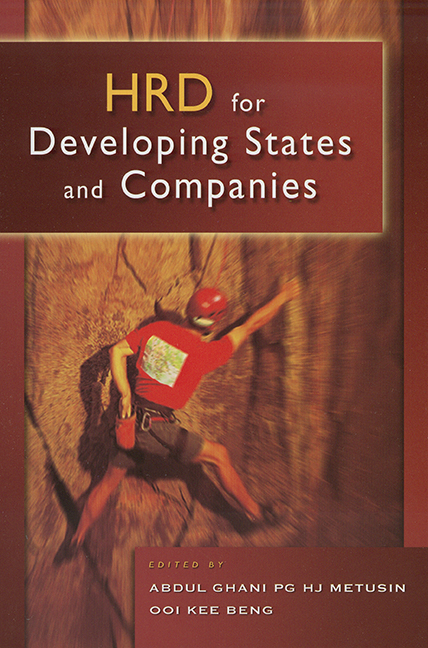Book contents
- Frontmatter
- Contents
- Foreword
- Preface
- Editorial Remarks
- Acknowledgements
- Introduction
- HRD for Statesmen
- 1 Human Resource Development in Developing Countries
- 2 Building the New HR Base — The Brunei Perspective
- 3 Managing and Achieving Excellence through HR Key Performance
- 4 Achieving an Integrated, Informed and Innovative Government for the Twenty-first Century — A Model for Emerging Markets
- 5 Human Resource Development — Challenges for the Public Services
- 6 Human-focused Management for Future Progress
- HRD Strategies for Companies
- Competence Development
- Corporate Experiences
- About the Authors
4 - Achieving an Integrated, Informed and Innovative Government for the Twenty-first Century — A Model for Emerging Markets
from HRD for Statesmen
Published online by Cambridge University Press: 21 October 2015
- Frontmatter
- Contents
- Foreword
- Preface
- Editorial Remarks
- Acknowledgements
- Introduction
- HRD for Statesmen
- 1 Human Resource Development in Developing Countries
- 2 Building the New HR Base — The Brunei Perspective
- 3 Managing and Achieving Excellence through HR Key Performance
- 4 Achieving an Integrated, Informed and Innovative Government for the Twenty-first Century — A Model for Emerging Markets
- 5 Human Resource Development — Challenges for the Public Services
- 6 Human-focused Management for Future Progress
- HRD Strategies for Companies
- Competence Development
- Corporate Experiences
- About the Authors
Summary
A methodology for achieving an integrated, informed and innovative government for the twenty-first century can build on three concepts:
• International Best Practice — Embracing international benchmarks.
• Modern Public Management Theory — Utilizing relevant concepts.
• Country-Specific Orientation, Values and Commitment.
Some common issues faced by governments of emerging economies including Brunei Darussalam are:
• The role of the ministry is often not clearly stated and its organizational structure is often out of date and reflects old concepts.
• Management methods are often old style and not relevant to a modern environment.
• Service delivery is generally poor.
• The tasks and the person hired are often mismatched in terms of quality and quantity.
• Performance measurement is not practised efficiently.
• The development of information technology is often unplanned, fragmented and significantly under-utilized.
A point worth discussing here is the professionalism of the public service. The public service is a corporation formed by all government employees, and is not an entity or institution. It is therefore necessary that government employees believe that they work for the government and not for individual ministries. The employees must be embedded with a strong corporate culture based on sound management practice, delegation of power and accountability. They must also comply to a uniform code of ethics.
An organization must possess effective policy-making elements in terms of transparent vision, mission and strategies or policies. An organization must have key processes and tools including standardized HRM, IT, corporate planning and service delivery. It must also possess human resources that are capable and motivated enough to carry out their duties using the key processes and tools implemented by the agencies for achieving the desire goals. At the same time, the employees must also be provided with clear job specifications and training so that they can utilize their potential and do their job.
- Type
- Chapter
- Information
- HRD for Developing States & Companies , pp. 24 - 26Publisher: ISEAS–Yusof Ishak InstitutePrint publication year: 2005

